South Africa
Letaba Archaeology Project
Iron Age communities in the Letaba-Olifants Confluence Area (LOCA) have long been dismissed as peripheral and irrelevant to understanding the emergence of better-known cases of southern African complex society development located in “cultural heartlands” hundreds of kilometers distant. Recent research, however, has identified LOCA communities as some of the earliest in southern Africa with evidence for imported technologies and sustained articulation with the Indian Ocean World System. Elsewhere in southern Africa, these are seen as prerequisites for the development of social and economic inequality. The present study is clarifying the nature of a probable Early Iron Age (EIA) central place community (Le6/7) in the Letaba River region of South Africa’s Kruger National Park (KNP), and enable fuller understanding of the variation to be observed in southern African complex society development. Systematic regional-scale settlement survey will determine how large and populous this community was, and if outlying occupation was drawn toward it. Field mapping and excavation will elucidate aspects of its organization, and provide characterizations of any variation in the standards of living, prestige, productive and ritual activities between households. Results will facilitate comparisons of the extent to which it differed in these respects from central places in other areas of southern African complex society development. Principal collaborators are Xander Antonites, Annie R. Antonites, and Ndukuyakhe Ndlovu. Funding has been provided by South Africa’s National Research Foundation, the U.S. National Science Foundation, and the universities of Hawai’i and Pretoria.
More information is available at www.archaeoletaba.com.
